
B2B Articles - November 16, 2016
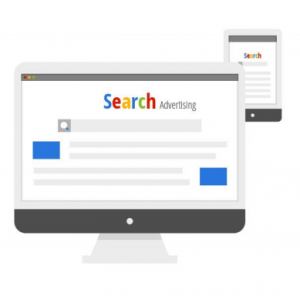 At a cumulative US$76.6 billion, the US, China, and Europe cover 84% of the global search advertising market. Here are more search advertising trends and stats digital marketers need to know.
At a cumulative US$76.6 billion, the US, China, and Europe cover 84% of the global search advertising market. Here are more search advertising trends and stats digital marketers need to know.
The pace of search advertising revenue growth — mobile and desktop — is predicted to drop steadily over the next five years.
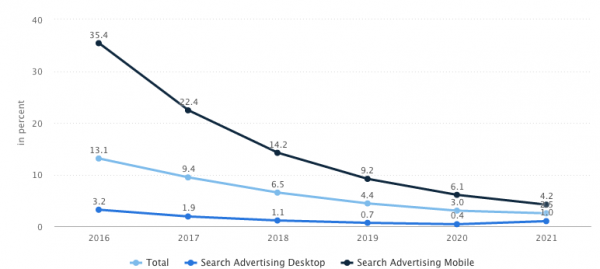
Yet the revenue this segment represents is still impressive and increasing. From $29,161 million US dollars in 2015, mobile and desktop search advertising revenue is forecast to reach $42,391 million in 2021.
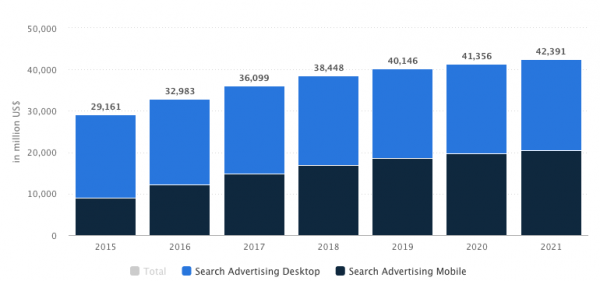
With its ability to reach potential customers in high-involvement buying decisions, search advertising nets higher average revenues per user — an estimated $124.54 US in 2016. Still, the revenue from desktop search advertising is expected to drop as mobile takes prominence.
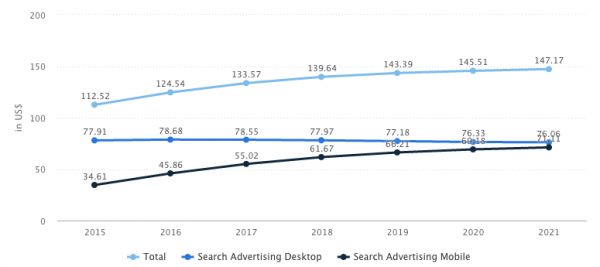
The US sees the bulk of search advertising market volume — $38,982.7 million US dollars. The next top-ranking countries are China ($24,039 million), the UK ($7,097.9 million), Germany ($3,256 million), and Japan ($2,990.7 million).
The majority of search queries are informational. Yet marketers can increasingly identify transactional and navigational searches.
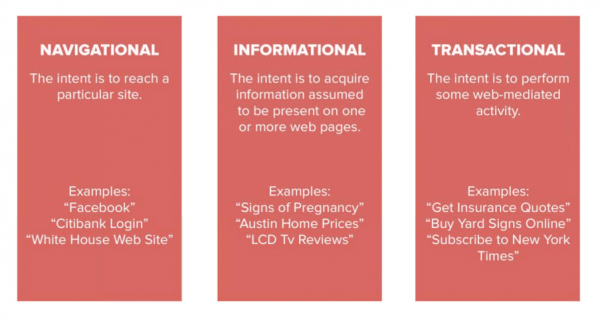
At the same time, search behemoth Google changes its search algorithm on a regular basis. Plus, it continues to unveil new ways for search advertisers to get their product or service “above the fold.” Where we used to see ten blue links and some ads on the first page, today, there are typically two to four targeted ads pushing organic search lower down.
Plus, Google is providing its own rich answers based on snippets and public domain information.
These, too, push search ads down that first page.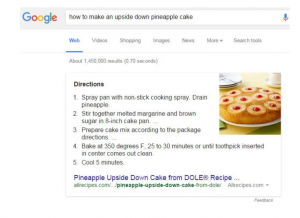 Stone Temple Consulting, in July 2015, analyzed over 850,000 search queries run in Google and found rich answers were served up 31.2% of the time (compared with just 23% in December 2014). That’s a nearly 40% increase in just six months.
Stone Temple Consulting, in July 2015, analyzed over 850,000 search queries run in Google and found rich answers were served up 31.2% of the time (compared with just 23% in December 2014). That’s a nearly 40% increase in just six months.
Just how powerful overall is Google in search?
Merkle further found that Google accounted for 95% of all phone paid search clicks.
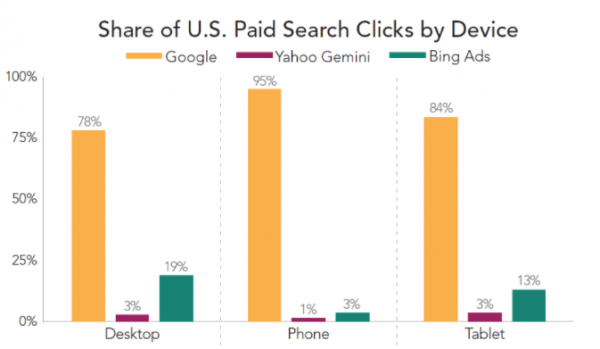
What does this dominance mean for Google? According to Merkle, in the first quarter of 2016, Google’s paid search ad spend was up 25%, while PPC was up 33%.
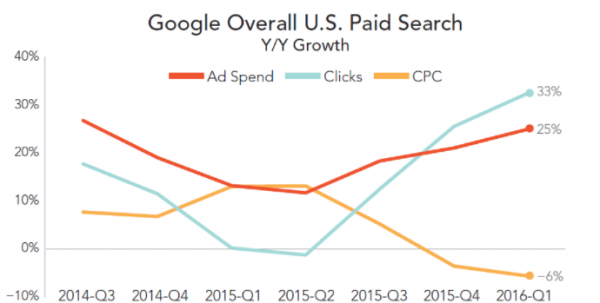
Yet inbound marketers are also looking today to search advertising on Facebook and other social media. After all, with 1.7 billion active users, Facebook is the largest and most popular social network in the world. Plus, one in every five minutes spent on mobile is on Facebook.
And mobile is a major player in digital search advertising spend.
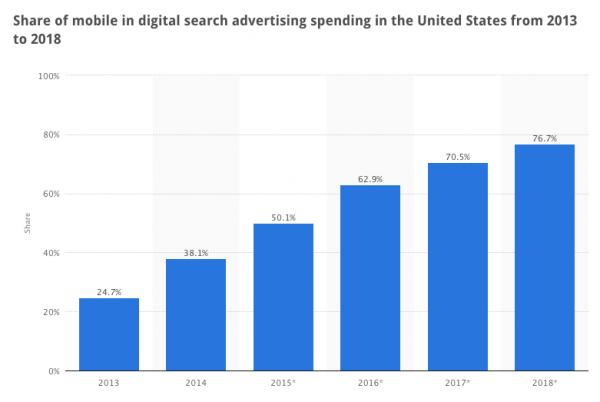
This is further driven by the increased usage of personal assistants on mobile devices. By 2015, 41.6% of 1,800 adult smartphone users in the U.S. had begun using voice assistant and voice search tools in a MindMeld study.
Some 55% of teens and 41% of adults use voice search more than once a day, according to Google. By 2020, voice- and image-based searches are going to make up at least 50% of searchers. The voice search queries will be more personal, descriptive, and specific.
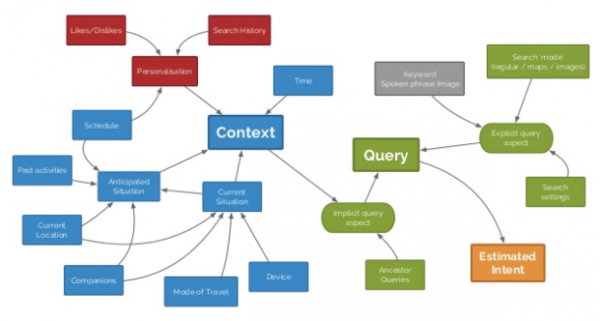
Related reading: How will voice search impact SEO
We want answers. That’s why search engines are often the most visited website in a country. Search advertising is increasingly complicated, but the depth of tools available to make the most cost-effective and efficient campaign choices are multiplying too. As new formats and devices such as voice search and VR come into play, the search advertising market will find new methods of expression. Advertisers and ad agencies must be ready to adopt these new formats and engagement tools.
Search Advertising Trends and Stats Sources
Anthony, T. (2016, March 23). Intelligent Personal Assistants, Search & SEO: SlideShare. https://www.slideshare.net/TomAnthony/intelligent-personal-assistants-search-seo
Bhuiyan, J. (2016, June 1). Mary Meeker: Voice and image searches are going to make up at least half of all searches by 2020. https://www.recode.net/2016/6/1/11829844/mary-meeker-voice-image-searches-2020
Buss, S. (2016, July). Digital Advertising Outlook: Search Advertising. https://www.statista.com/download/outlook/whiterpaper/Search_Advertising_Outlook_0716.pdf
Enge, E. (2015). How Rich Answers Provide a New Approach to SEO. https://www.convinceandconvert.com/digital-marketing/new-seo/
Patel, N. (2016, August 9). Type No More: How Voice Search is Going to Impact the SEO Landscape. https://neilpatel.com/2016/08/09/type-no-more-how-voice-search-is-going-to-impact-the-seo-landscape/
Smulski, J. (2016, November 10). Why and How B2B marketers should be using Facebook Ads. https://www.business2community.com/b2b-marketing/b2b-marketers-use-facebook-ads-01702644#zd1vcPWstVUfQHxl.99
Sterling, G. (2015, December 10). MindMeld Launches Voice Assistant 2.0, Says Voice Search Growing Dramatically. https://searchengineland.com/mindmeld-launches-voice-assistant-2-0-says-voice-search-growing-dramatically-238130
Taylor, A. (2016, April 25). Google Dominance Grows with Mobile Search. https://www.merkleinc.com/blog/google-dominance-grows-mobile-search
Tel 212-993-7809
Ironpaper ®
10 East 33rd Street
6th Floor
New York, NY 10016
Map
First-party data marketing
SEO for B2B
Customer journey strategy
ABM Agency
Marketing for IoT Companies
HubSpot Implementation
B2B Product Marketing
Measurable Marketing
IoT go-to-market strategy
IT Marketing
HubSpot for ABM
Go to market strategy
Technology Marketing
Marketing for IT Companies
ABM Campaigns
B2B lead generation
B2B Marketing and Growth Agency.
Grow your B2B business boldly. Ironpaper is a B2B marketing agency. We build growth engines for marketing and sales success. We power demand generation campaigns, ABM programs, create B2B content, strengthen sales enablement, generate qualified leads, and improve B2B marketing efforts.